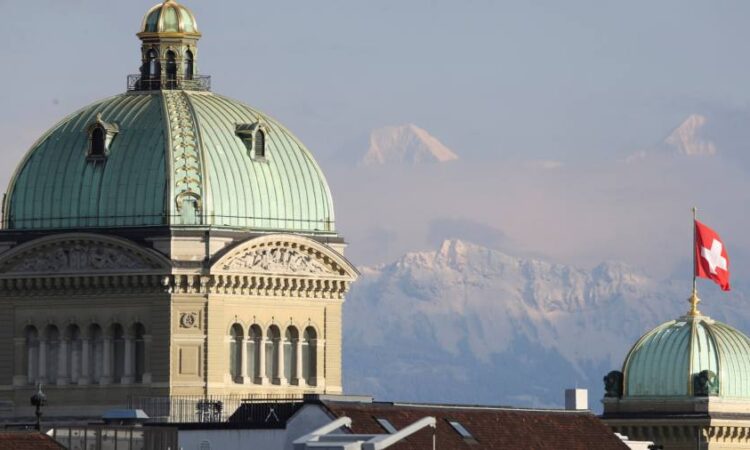
The G7 has privately rebuked Switzerland for not doing enough to combat Russian oligarchs evading sanctions.
A letter sent to the Swiss government, signed by G7 ambassadors in Bern on behalf of the group, as well as the EU’s ambassador, said Swiss privacy laws and other “loopholes” were being exploited by Russians to hide billions of francs in offshore assets.
Switzerland, which is officially neutral, has publicly moved in lockstep with the EU in enacting economic sanctions against Russia following Moscow’s full-scale invasion of Ukraine last year.
According to the Swiss state secretariat for economic affairs (Seco), SFr7.5bn of Russian assets have been frozen.
But G7 ambassadors cast doubt on that figure. “Independent sources estimate the total held in Switzerland could be significantly higher,” they wrote.
The letter, dated April 5 and addressed to the governing Federal Council, thanked Switzerland for its “laudable and significant” efforts to stop the country becoming a “safe haven” for Russian money. But it added that more work was urgently needed to ensure compliance with the sanctions regime.
“Concern has emerged about the possibility that Swiss privacy provisions . . . could be used to cover the tracks of financial shelters [sic] . . . We also have concerns that law enforcement officials are blocked from investigating illicit financial structures . . . because of privacy protections,” it said.
“[Swiss officials] were unable to freeze assets under protections for dual nationals, legal residents, those with legal ties to Swiss entities, or those holding indirect beneficial ownership. We share a concern that these loopholes to legal action put Switzerland at reputational risk.”
A copy of the letter was obtained by the Financial Times and verified as genuine by senior diplomats from two G7 powers. The contents of the letter were first reported by Switzerland’s Handelszeitung newspaper.
A spokesperson for Seco said the G7 ambassadors’ claims were “baseless” and stressed that the Swiss government had been “swift to align itself” with western sanctions on Russian money.
“Ensuring their full and effective implementation is a priority for the Federal Council,” they said. The spokesperson added that the G7 ambassadors appeared to have misunderstood relevant areas of Swiss law. They said dual nationals and residents were subject to sanctions and Swiss lawyers were criminally liable for facilitating sanctions evasion.
In an interview with the NZZ newspaper this week, Seco’s new director Helene Budliger Artieda pointed out that Switzerland’s tally of frozen Russian assets was a third of the size of those frozen across the whole of the EU. France has frozen just SFr1.2bn ($1.3bn) and Germany SFr2.2bn, she noted, decrying the finger-pointing from neighbours.
Authorities in Bern had not been given any tangible information from partner countries about Russian assets held in Switzerland that had slipped through the net, she said.
Bern has nevertheless tried to resist the implementation of stricter financial measures against Moscow, in particular the permanent confiscation of Russian assets.
Any appropriative measures beyond temporary asset freezes, the Swiss government said in February, would be unconstitutional and unenforceable in Switzerland.
Many of the country’s biggest banks have also begun to fret over potential negative consequences for Switzerland as a result of it matching western sanctions. In particular, they worry about the message being sent to rich Chinese clients who they count among their most lucrative customers.
The country’s biggest political party, the rightwing populist SVP, has also opposed measures that it said would damage Switzerland’s neutral standing.
US ambassador Scott Miller warned last month that Bern’s conflicted stance over Ukraine was evolving into its greatest political challenge since the second world war.
“Switzerland cannot call itself neutral and allow one or both sides to exploit its laws for their own benefit,” he said.






